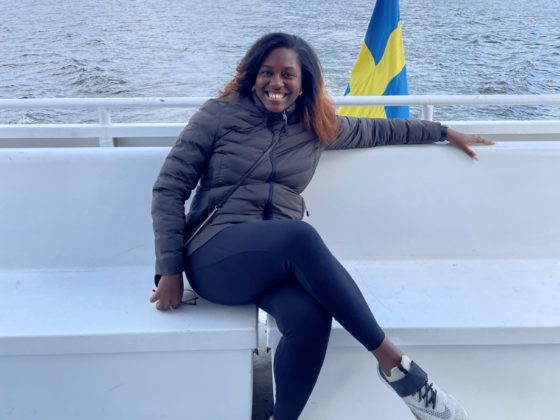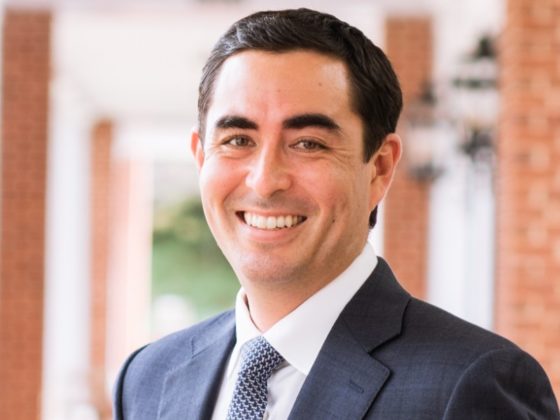Rebecca San Juan (EMBA Class of ‘25) is a graduate of Mount Holyoke College and an award-winning journalist at the Miami Herald. She was part of the 37-member Herald team that won a Pulitzer Prize for breaking news coverage of the collapse of the condominium Champlain Towers South in Surfside. Today, she writes about commercial and residential real estate. She balances her work at the Herald while pursuing an executive MBA at Darden. Currently halfway through the program, San Juan aspires to use her MBA studies to grow as a business and real estate reporter.
In June 2024, she traveled with 17 classmates to Germany for a weeklong Global Residency.
1) Tell us about yourself, Rebecca!
I am a first-generation Cuban American born and raised in Miami. News always united my family. My Mom got me hooked on listening to WLNR – the local NPR station – when I was a kid. We also often watched Larry King, Christiane Amanpour, or Oscar Haza. Although I grew up with a deep appreciation for journalism, it wasn’t until I read Nazila Fathi’s New York Times coverage of women in Iran protesting for their rights that I thought of pursuing a career in journalism. Her work pulled back the curtain on a part of the world I knew very little about and made me curious to learn more.
A college summer internship at Reuters TV in Hong Kong got me hooked on business journalism. Business journalism combined what I was already interested in – politics and foreign affairs – with economics, real estate, and large and small businesses. It fascinated me to see how a territory’s economic positioning, such as Hong Kong, could influence China or its positioning on the global stage. I also enjoyed learning how an international company might tailor its next line of products to a totally different market. I saw this with Italy’s high-end luxury lingerie brand La Perla chasing after Chinese buyers.
Fast forward to my joining the Miami Herald in 2019, I was already thinking about furthering my education. I eventually decided an MBA was the right choice for me for many reasons, including my desire to gain a foundation in business to enhance my real estate coverage and expand my opportunities within the journalism industry. Darden was the place where I wanted to pursue my education, given its reputation for having highly respected and highly engaged professors, the chance to study in D.C. – a place I always wanted to study in after watching Aaron Sorkin’s “The West Wing” – and a community of inspiring peers and alums, including a long line of journalists thanks to the Batten Media Fellowship.
2) What motivated you to select Germany for your Global Residency?
Germany was my top choice. First, Germany is recognized as an established leader in Europe for many reasons, including international relations, thriving manufacturing industries, and higher education and research. They have brands that are known worldwide, such as BMW, and I wanted to understand what type of government policies or business environment made it possible for these companies to thrive within the country.
Second, as a journalist, I am constantly thinking about innovation in the newsroom and how things can be streamlined. I wanted to see how tech was being used across different industries to streamline production and to be exposed to new forms of artificial intelligence or new tech that may be helpful for a newsroom.
3) What was the most memorable experience you had during your GR?
The trip was filled with numerous memorable moments. We got to tour the manufacturing and production factory for BMW, learn and play with the latest artificial intelligence tools with an expert from Deutsche Bahn, and meet with the growing Zalando company, which aspires to become Europe’s Amazon in the fashion industry.
Of all of the company tours, the highlight was meeting with the leaders of chip manufacturing company AEMtec. The company asked students to participate in a live case study and help them decide whether they should open a manufacturing plant in the United States. The company already had an office in Boston and had a steady stream of business, but executives weren’t sure whether it was enough to justify an expansion and whether they would gain more business by producing chips in the U.S. We played the role of consultants and shared our overall thoughts on the move and possible cities to consider expanding into, which was exciting. We also got a tour of their labs where they produce the chips. Everything we had learned at Darden came into play, including marketing and our operations and management systems courses.
Besides the company visits and presentations, we had a lot of fun after each day. The highlight was our last night in Munich when we all met at Anderswo im Westend for a three-course meal cooking class. It was a moment where we all got to unwind, recap the entire trip, and two classmates and friends showed up in traditional Lederhosen – every moment was just filled with a lot of joy, laughter, great food and, even better, the best company.
4) How did your time in Germany influence your understanding of global business practices?
The experience gave me a framework for how to do business abroad. Long before we even stepped on German soil, our cohort was tasked with pairing up and presenting briefing books. We each summarized in two to four-page papers different aspects of Berlin and Munich and later went around to share our findings among our peers going on the trip. My briefing book partner Shane Bowling – who had a wealth of knowledge on Germany – and I covered key historical moments that shaped Berlin and Munich. Others covered immigration, health, education and other topics.
Preparing my own brief, preparing for my own presentation, and listening to others’ presentations gave me a well-rounded understanding of what had shaped Germany to become the country it was today and trends shaping its future. It went beyond the typical prep I normally do as a tourist or even for work conferences. The advantage is you go in with a basic foundation in understanding the country and the cities you’re visiting.
Second, on our first day we met a Darden alum who was born in Germany and lives in Berlin. He gave us insider information only a local can give. For example, he said Germans like to be treated as kings. They like to have a lot of formality in the beginning. They like to be treated with the utmost respect. That’s great to know because you go in right off the bat knowing the business norms. Every country is different. Having that perspective is invaluable.
Third, I found it helpful to file a paragraph every day on what surprised us about that day and reflect on that. I loved that task because it forced me to pause and reflect. When I have traveled for conferences, I feel like the day can just fly by. Something about having to type out my thoughts made the lessons of that day sink in. How does that pay off in terms of business practice? The next day I felt sharper in my reflections and analysis. I’m not talking in generalities or at a surface-level observation, but rather the ability to tie together relevant details. So, for example, I’m not just going to say, “Sustainability is a concern among German companies.” Instead, because I took time to reflect, I can say, “Sustainability is a top issue in Germany because the European Union recently passed regulations forcing companies to cut back on emissions, plastic and waste. This is forcing companies to think about innovation in terms of every aspect of their production line, including international firms like BMW.”

5) What are some key differences you noticed between the business culture in Germany and the U.S.?
The first key difference is the level of formality. The Darden alum who met with us during our first day in Berlin compared Germans to coconuts. They have a hard shell with a soft inside. It takes time to earn their trust, but once you do, they’re your friends for life.
Second, in terms of the business culture, employee loyalty remains very high. It’s normal to see employees work at the same firm for 20 years.
That’s in part due to the limitations on career switchers. Every job requires a certificate. Even a plumber or handyman must have a certificate of completion in plumbing to do that job. This makes it hard for someone to switch careers.
6) What advice would you give to other EMBA students considering participating in a Global Residency in Germany?
Take a notepad and pen to all of these meetings. Jot down the company name, speaker’s name, title and three key themes that you learned from that interaction. This will help with the daily reflections and the lessons you carry with you long after the trip.
Second, connect with the professor ahead of your travels. Our designated academic lead and guide, Stefan Ruediger, offered to meet during virtual office hours before the trip to answer any questions students had. I took advantage and picked his brain on where to explore before programming officially started and after it wrapped. As a native, Stefan knew the best places to visit and how to get there. Thanks to my conversation with Stefan, I knew it would be great to visit Potsdam just outside of Berlin and was able to have a day trip with my classmates.
Third, prioritize time with classmates after the day wraps. Soak in as much Darden time as possible. Whether I was shopping in Germany’s beloved TK Maxx – their version of TJ Maxx – after the end of a day or touring Nuremberg with a classmate and friend after the week ended, exploring together was the best. Time together makes invaluable memories.



